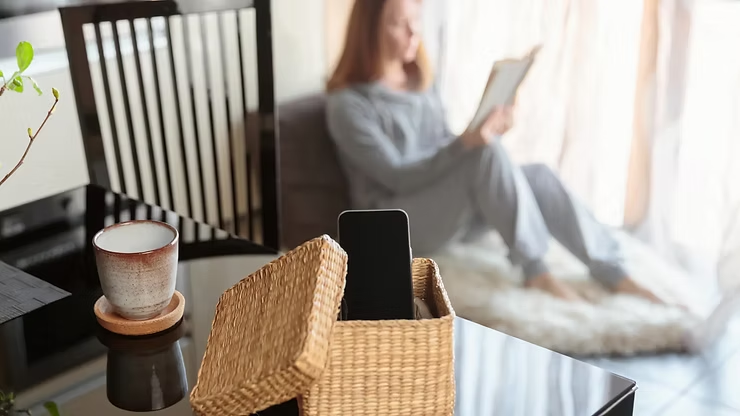
Did you know that many young adults check their phones every 15 minutes? Or that Instagram has been called out for its negative effects on mental health? It’s eye-opening to realize that we might be swiping and scrolling away our well-being.
If your day starts and ends with checking social media or you find it hard to concentrate because of constant notifications, it might be time to hit pause with a digital detox. Research shows that stepping back from screens can have real benefits for your physical, mental, and emotional health. Let’s explore why taking a break from technology might be just what you need and how a digital detox can help you reset.
What is a Digital Detox?
A digital detox is simply taking a break from all your digital devices—like your phone, computer, or tablet—for a set amount of time. The goal is to disconnect from the constant stream of notifications, emails, and social media in order to reconnect with yourself and the people around you. It’s about taking a break from the noise and finding peace in the present moment.
Why Mindful Technology Use is Needed
Have you ever felt your phone vibrate when it didn’t or open the same app over and over without thinking? These habits are common and are often designed into the apps we use daily. Bright red notifications, infinite scrolling, and disappearing content are all tricks to keep us engaged. But while these apps capture our attention, they can also make us feel stressed, anxious, or overwhelmed. That’s why mindful technology use is essential for a healthier relationship with our screens.
Is a Digital Detox Right for You?
Think about whether any of these apply to you:
You feel the urge to check your phone frequently, even when there’s no reason.
After using social media, you feel more stressed or anxious than before.
You’re losing sleep because you stay up late scrolling through your phone.
Misplacing your phone triggers feelings of anxiety or stress.
Your phone distracts you from spending quality time with others.
If any of these feel familiar, a digital detox might help you reset and find a better balance.
Benefits of a Digital Detox
Even if you think your tech habits aren’t that bad, taking a break can make a big difference. Here are some benefits of a digital detox:
Less Stress: Stepping away from the constant alerts can reduce mental overload.
Better Focus: Without digital distractions, it’s easier to stay focused on tasks that matter.
Improved Sleep: Reducing screen time, especially before bed, can lead to better, more restful sleep.
Stronger Connections: Being present in your real-world relationships deepens your bond with others.
More Free Time: Without the pull of constant notifications, you’ll find more time for activities you enjoy.

How to Do a Digital Detox
If your relationship with your devices is interfering with other priorities, it may be time to think about cutting back on your digital life and focusing more on the real world.
For some individuals, a full detox may be an option. But for most, cutting yourself off completely from all things digital may not be realistic. So rather than going “cold turkey,” you can take small steps and still reap the benefits.
1. Start by asking yourself the following questions:
How long do I spend using an electronic device or watching a screen each day? Use your device’s screen-time tracking functions to understand how much time you spend on your phone or device throughout the week. If you use your devices for work, separate out work from leisure time by app.
How is technology making me feel? What parts of technology, screen time, and social media feel positive? And what leaves you feeling worse than before—like feeling guilty, stressed, tired, or inadequate?
Am I experiencing any problems from media and technology use? Not getting enough sleep, missing out on important moments, relationship strain, procrastination, or neglecting self-care are common issues that could arise from your digital habits.
What matters most to me in terms of my priorities and values in life? Are your tech habits helping or hindering what you value most? Evaluate whether your device usage aligns with your priorities, and think about ways to make your tech use work better for you.
2. Make a Plan
Identify what’s negatively impacting your life, and take steps to change it. For instance, if you find yourself constantly on your phone, consider setting specific times during the day for checking emails, messages, and notifications. If social media is the source of stress, take a break from those platforms for a set period of time to see how it affects your mood.
3. Set Specific Goals
Once you’ve identified your plan, get specific. For example, try implementing device-free meals with family or friends. You might decide to take a week off from social media or set a daily time limit for your app usage. Turning off notifications can help reduce the temptation to constantly check your phone. Use built-in settings or apps to monitor and limit your usage. Stick to your plan, be specific, and give yourself enough time to adjust.
Here are some revised examples of goals:
For the next month, I’ll put away all my devices one hour before bed to improve my sleep quality.
For the next 2 weeks, when I’m in social situations, I’ll keep my phone on silent and out of reach to be more present with others.
Over the next 7 days, I will reduce my social media time by 2 hours each day using an app timer.
During work hours, I will leave my phone in another room to help me focus better and get more done over the next 3 months.
I will take a 14-day break from Instagram and explore offline activities to reduce stress and improve my mood.
4. Tell Family and Friends
Let your loved ones know that you’re stepping back from your devices and might not respond right away. Having their understanding and support will help you stay committed to your digital detox and feel more at ease as you disconnect.
Tips for Mindful Tech Use
If the idea of completely unplugging feels too daunting, you can still make tech use more intentional with these tips:
Schedule Breaks from Screens: Make time each day or week to disconnect from your devices, even if it’s just for a few hours.
Set Time Limits: Use screen time management tools on your phone to limit how much time you spend on certain apps or activities.
Declutter Your Digital Life: Organize your phone or computer by deleting apps you don’t use and simplifying your digital space.
Reconnect with Offline Activities: Spend time on hobbies, exercise, or other activities that don’t involve screens.
Ready to Reclaim Your Time?
Taking a break from your devices can help you feel more in control, present, and connected to the things that really matter. Whether you try a full detox or just start with smaller changes, the benefits of unplugging can improve your life in many ways.
Remember: if you’re feeling overwhelmed, don’t hesitate to ask your primary care provider or a mental health provider for help.